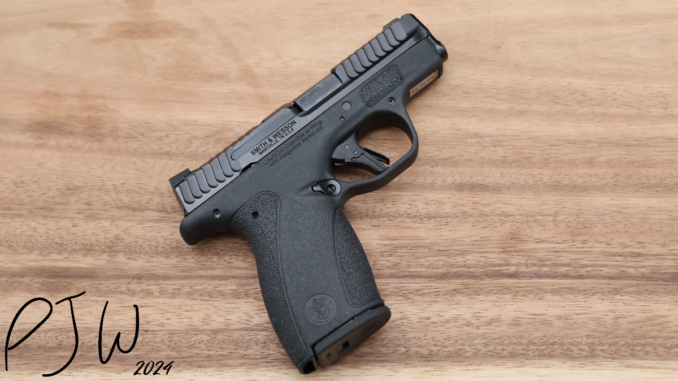
The Smith & Wesson Bodyguard 2.0. You already know what it is. It’s been heavily featured in recent gun media, and has been shilled to hell and back. I haven’t seen this much hype since the media push for the Walther PDP back in 2021. Well, I’m already working on my Pocket Pistol Roundup for this year, and the BG 2.0 needed to be on there. I bought one in Summer 2024, and have a lot to say about it. Is it the best thing since sliced bread, or is it another overhyped gun?
What is the Smith & Wesson Bodyguard 2.0?
The Bodyguard 2.0 is Smith & Wesson’s new, compact .380 pistol. It’s called the “2.0”, but in reality, it doesn’t share much in common with the Bodyguard 1.0, aside from caliber and small size. The 2.0 is the first handgun to be made at S&W’s new production facility in Tennessee, and retails for $449. Street price is closer to $400, which is what I paid for mine, at a local big-box store.
You’ve probably already seen plenty about this gun online, but I’ll touch on the notable features.
Bodyguard 2.0 Features
S&W packed a lot into this little gun, and I think that the size is the impressive thing.
The BG 2.0 is a small gun. In a world with slimline and micro-compact guns, this one is remarkably tiny, yet still offers a lot of real estate to hold onto.

The BG 2.0 has a very large gripping portion of the frame. There’s aggressive texturing on the front and back straps, and a little less aggressive patterning up the sides. The gun really sinks well into the hand.
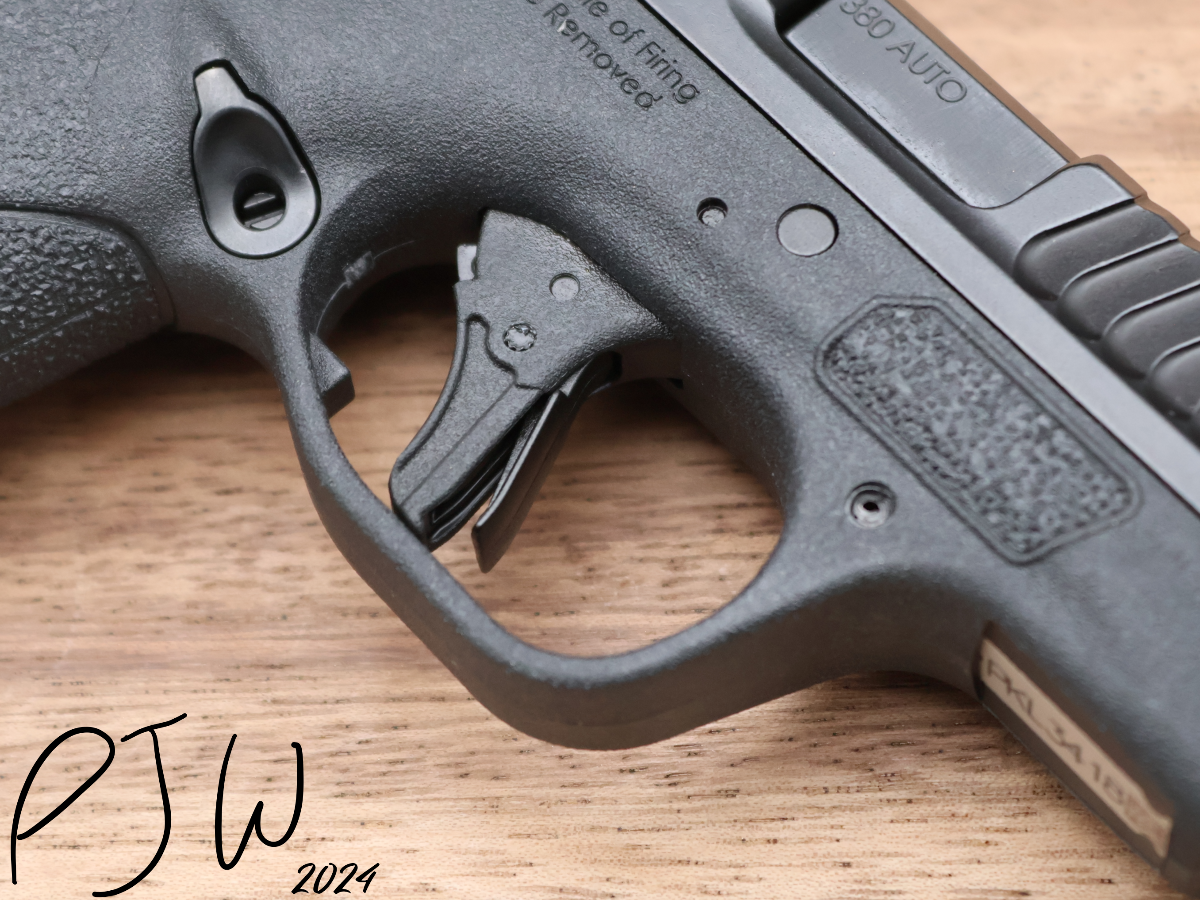
There’s a flat trigger on the 2.0, with a trigger dingus safety. Pull on my gauge is about 4.4lbs, and it is fairly crisp.
The sights on the BG 2.0 are quite good. We’ve got a deep, serrated rear U-notch sight, and an orange tritium-vial filled front sight. These are high visibility, and are really quite good for this small gun.

Capacity is extremely good for the size, with a flush fitting 10 round mag, and an extended 12 round magazine. The 12 rounder comes with a pinky extension filler too, which also helps to prevent over-insertion into the gun. These magazines are very stiff to load.

While the frame is grippy, the slide is even grippier. We’ve got slide serrations at the front and back of the gun, and they wrap overtop too. This is a gun that has a stiff recoil spring, so extra texture certainly helps out. Speaking of stiff springs, like a lot of small S&W autoloaders, the slide release is very stiff to depress.
So we’ve got a small gun that holds a lot of rounds, can be pretty easily gripped, and has good sights. How does it compare to some other comparable guns?
Size Comparisons
I started the 2024 Pocket Pistol Roundup with the Glock 42 and Ruger LCP as my pocket .380s, but added the Bodyguard 2.0 in August. How does the BG 2.0 compare to those guns?
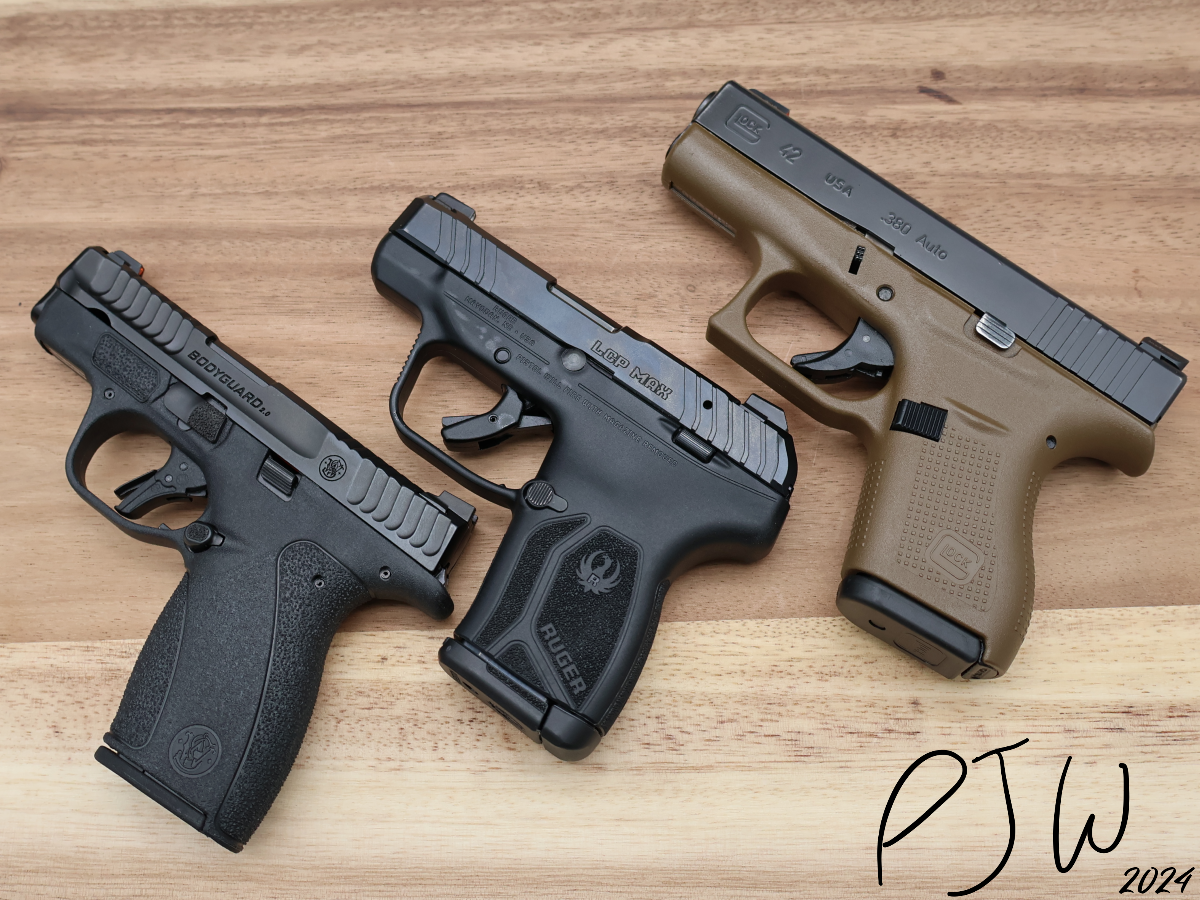
The Bodyguard 2.0 and the LCP Max are about the same size. The BG 2.0 has more space for gripping the gun than the LCP Max. This is due to the action type, as the striker-fired design of the BG 2.0 takes up less vertical space in the frame than the hammer-fired design of the LCP Max. Both guns are smaller than the G42.
Capacity is the same for the LCP and BG, as both hold 10 rounds in their flush fitting mags, and 12 in extended mags. The G42 holds 6 in a flush mag, and can go up to 10 rounds depending on the magazine extensions that you use.

Loaded weights across the guns does run a bit of a gambit. The LCP Max and BG 2.0 are pretty close, but the G42 is a little heavier. Weights are loaded with flush mag, plus one in the chamber, and with an appropriate pocket holster.
BG 2.0 weight: 15.6 ounces
LCP Max weight: 14.4 ounces
G42 weight: 16.4 ounces
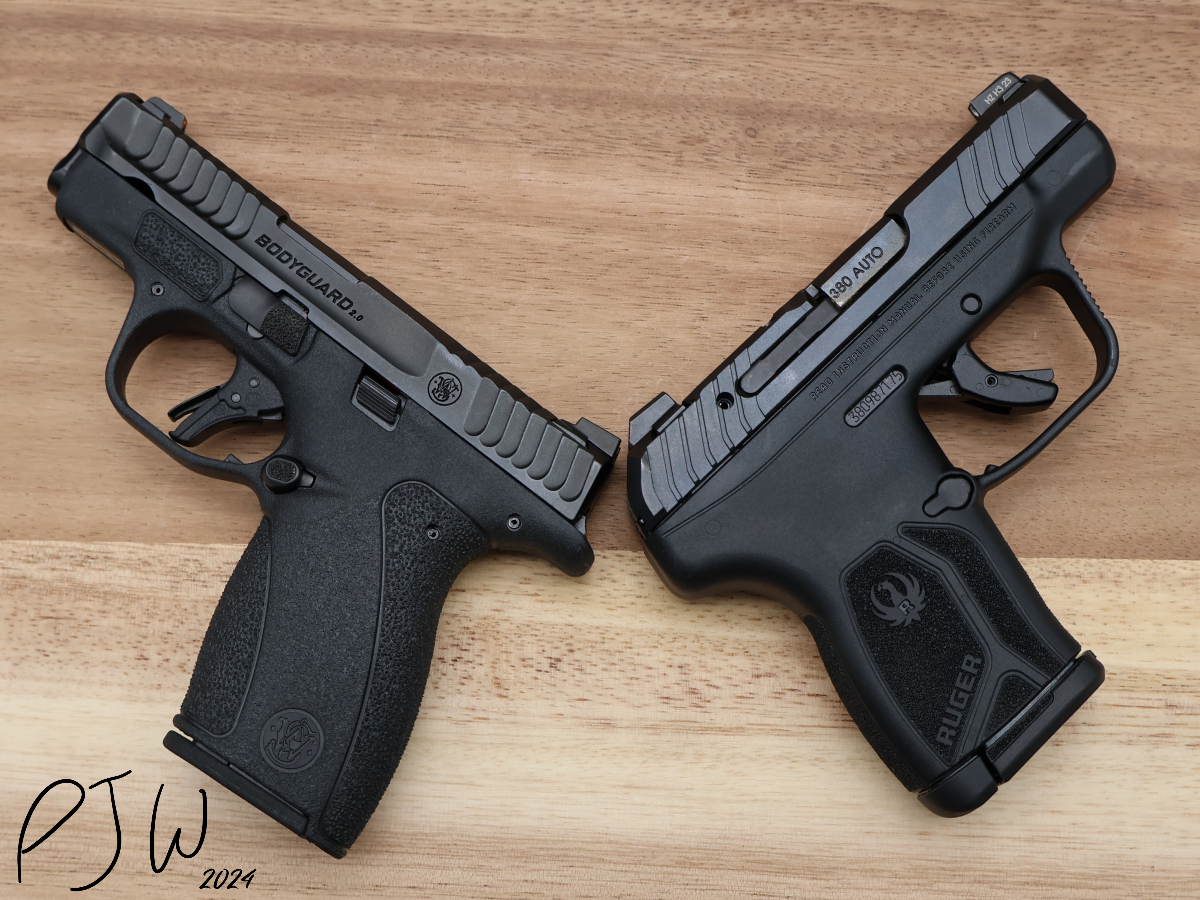
The last comparison I’ll make are the sights. The BG 2.0 and LCP Max both feature deep rear U-notch sights, and a high visibility front. The G42 ships with standard plastic Glock sights, which you can swap easily for something better (and you should).
There’s certainly more that separates these three guns, but the size, capacity, weight, and sights are the big things to touch on. Now, how the guns shoot is a critical thing, something that you won’t see in a simple comparison. How does the S&W Bodyguard 2.0 shoot?
Shooting Characteristics
Cutting right to the chase, the Bodyguard 2.0 has pretty favorable shooting characteristics.
First and foremost, recoil is surprisingly pleasant. This isn’t a gun that I’d like to shoot 1000 rounds through over a weekend, but shooting a couple hundred rounds is fine. The recoil impulse is sharp and fast rearward, which leads to fast follow up shots.
The quality feel of the frame combined with the large gripping surface really helped to lock the gun into my hands. Shooting one or two handed was a breeze with the BG 2.0. The trigger pull is pretty good too, and did not get in the way of my performance.
Now, I appreciate the high visibility sights, but I do have a gripe. The rear sight U-notch is far too wide. I get that it is fast to acquire a sight picture, but tightening up that rear sight wouldn’t really slow things down, but would allow the shooter to be more precise past 10-15 yards. My gun was also shooting off to the left at most distances, which was only exacerbated at distance.
Reliability was, well, not perfect. I tested 4 types of JHP ammo, and some FMJ through the gun. I ran into some malfunctions, but still recorded footage of that testing, linked below.
I was not particularly happy with the reliability of the gun. That being said, I test guns, so I know that we cannot expect them to be perfect all of the time. However, between the mediocre reliability and the gun shooting off of the sights, I had some work to do to correct the issues. Well, I thought I had work to do. It turns out that I got S&W’d, and had some QC issues.
QC Issues
Well, S&W is not known for good QC. For the last 3 decades, they’ve had pretty spotty quality control, and it’s only getting worse with each passing year. I’ve personally got two new production S&W revolvers with significant QC issues, and now I’ve got the BG 2.0.
The first issue is that the gun doesn’t shoot to the sights. The rear sight on my gun was not centered, and was visibly offset in the dovetail. Simple fix, right? Just drift the front and rear sights, get the gun regulated, and go on with your day. One issue, my rear sight will not move in the dovetail. Despite using a sight pusher, then my vice with a set of quality punches and hammers, the rear sight will not budge.
The next issue is with the feed ramp. On the BG 2.0, the gun uses a 2-piece feed ramp, like a 1911. As such, part is on the frame, and the other part is on the barrel. Well, I’ve got a big ledge on the frame portion of the feed ramp, that is causing the failures to feed on the gun.
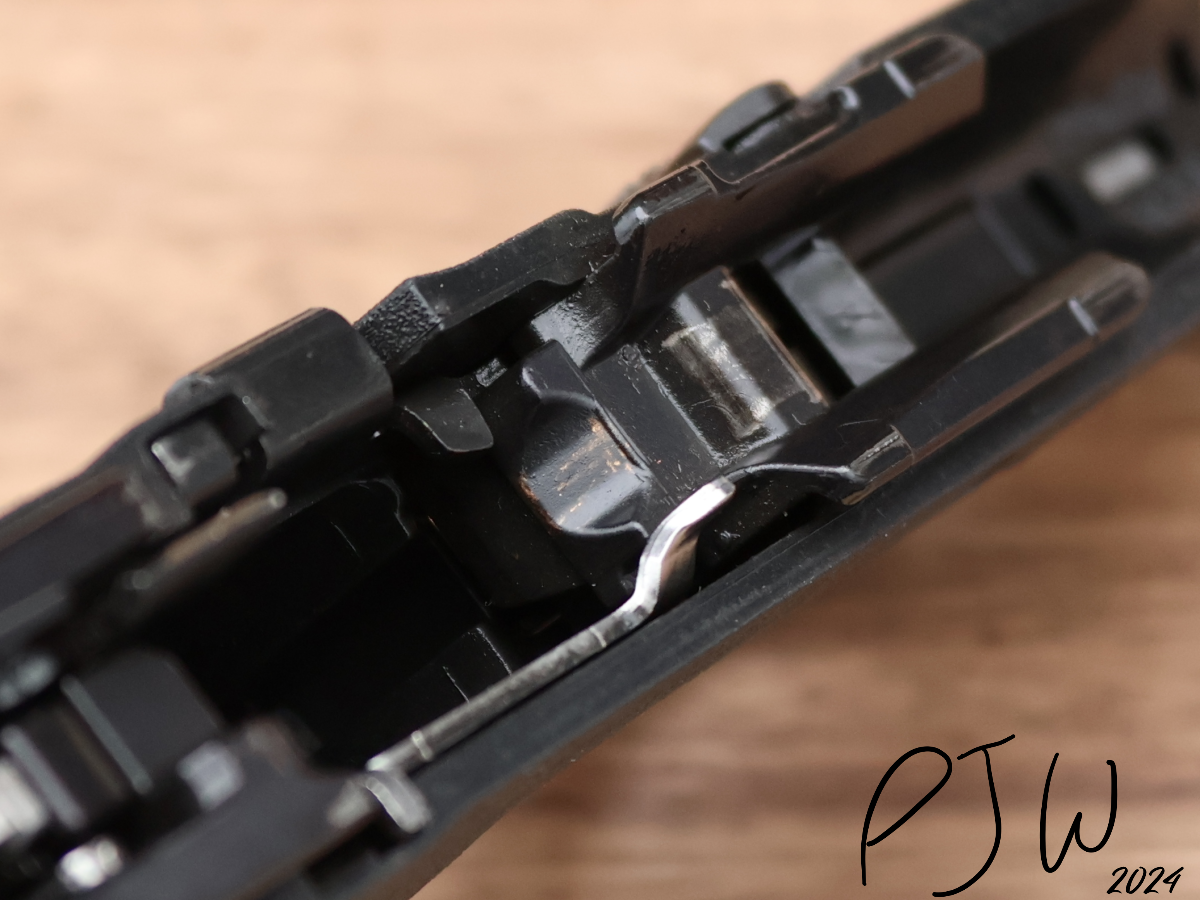
This ledge is something that I could hypothetically sand, file, or Dremel off of the gun, but that’s not something that the end user should have to do.
The final issue with my gun is that the 12 round magazine can only be filled to 11 rounds of .380. Despite using a magloader, the magazine will not allow for 12 rounds in it.
I made a video where I go over all of the issues, which I show in pretty good detail there.
Mo Money, Mo Problems
After uploading my video on the issues of my gun to YouTube, I did a lot of research on issues with the BG 2.0. I found quite a few. This is a culmination of my internet sleuthing, and comments left on my video.
Issues that are common:
- Feed ramp ledge that impedes consistent reliable feeding
- Rear sight not centered in dovetail
- Rear sight seized in place
- 12 round magazine not being able to be loaded to 12 rounds
- Recoil assembly is hard to reinstall into gun (inconsistent guide rod length and/or poor geometry for mating the guide rod to the barrel or slide)
Issues that I’ve seen, but wouldn’t consider common:
- Inability to remove the slide from the frame
- Extractor breakage after a few magazines
- A BG 2.0 shipping without having an ejector installed
Now, I’m obviously not stating that EVERY BG 2.0 has these issues. I have seen plenty of guns that don’t have any serious issues, and have seen guns with nearly all of the common problems. That’s the thing about bad QC, it’s consistently inconsistent.
Why is the QC bad here? Well, there’s a few parts to it. S&W recently moved from Massachusetts down to Tennessee to produce guns. I’m sure that there are some teething issues for getting setup there. There’s also the whole “profit margin” element, to which I touch on in my QC article from earlier this year. I also think that the design is pretty complicated, which compounds the QC problems when they arise.
A Complicated Design
The BG 2.0 is not a simple gun. There are a lot of design choices that were made to make the gun smaller (I think), and they make the gun a more complicated design.
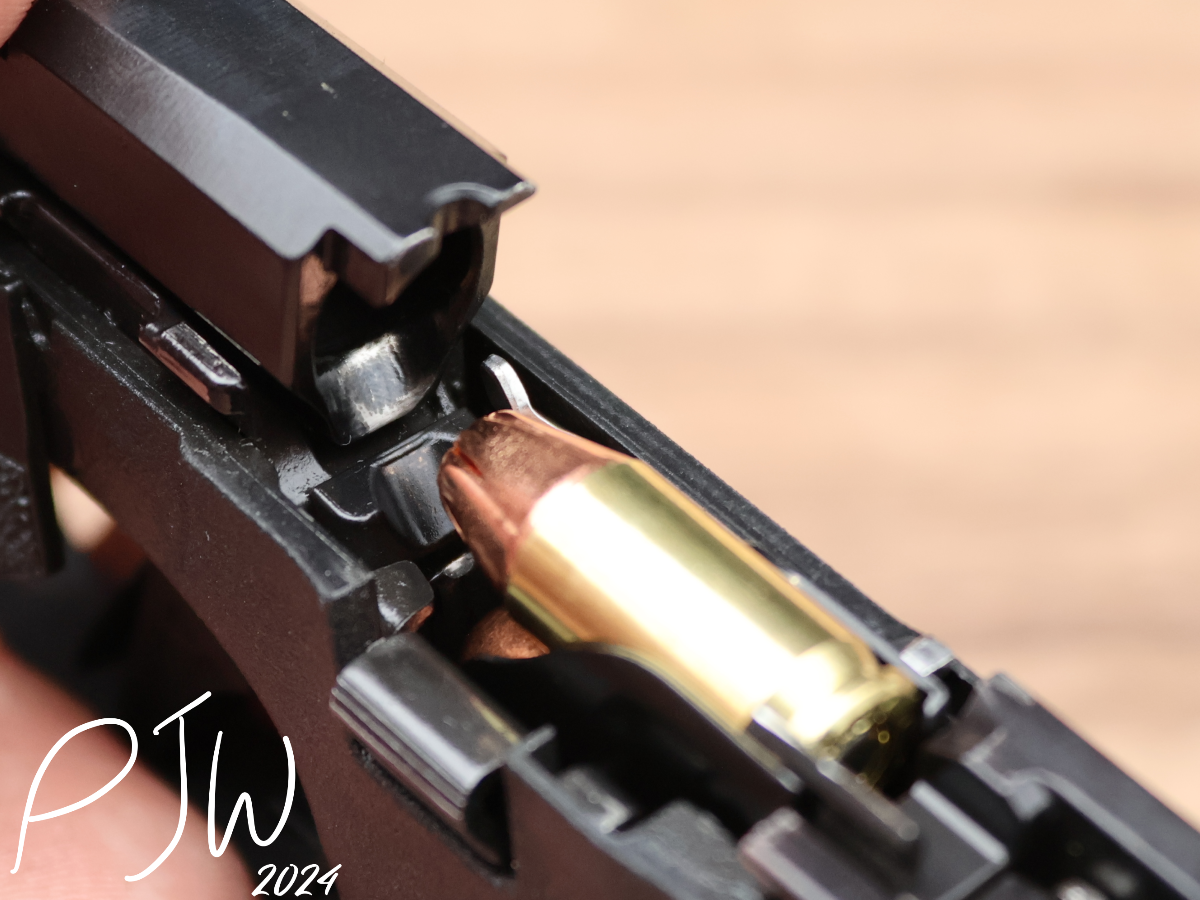
A two-piece feed ramp is something that can make a gun a little shorter, compared to the more common ramped barrel assembly. However, we’ve now got two elements that need to be well made to ensure feeding, and we’ve got more parts on the gun.
Another oddity is the slide assembly. The rear sight is used as the retainer for the back plate on the slide. To take the slide apart, you need to drift out the rear sight. This is something that you don’t see on most guns, and with my specific BG 2.0, that means I cannot fully strip the slide. S&W took this design to (likely) reduce overall height. In addition, the striker assembly is under no tension when the slide is out of battery, so this retainer method was needed so that the gun wouldn’t take itself apart during the recoiling process.
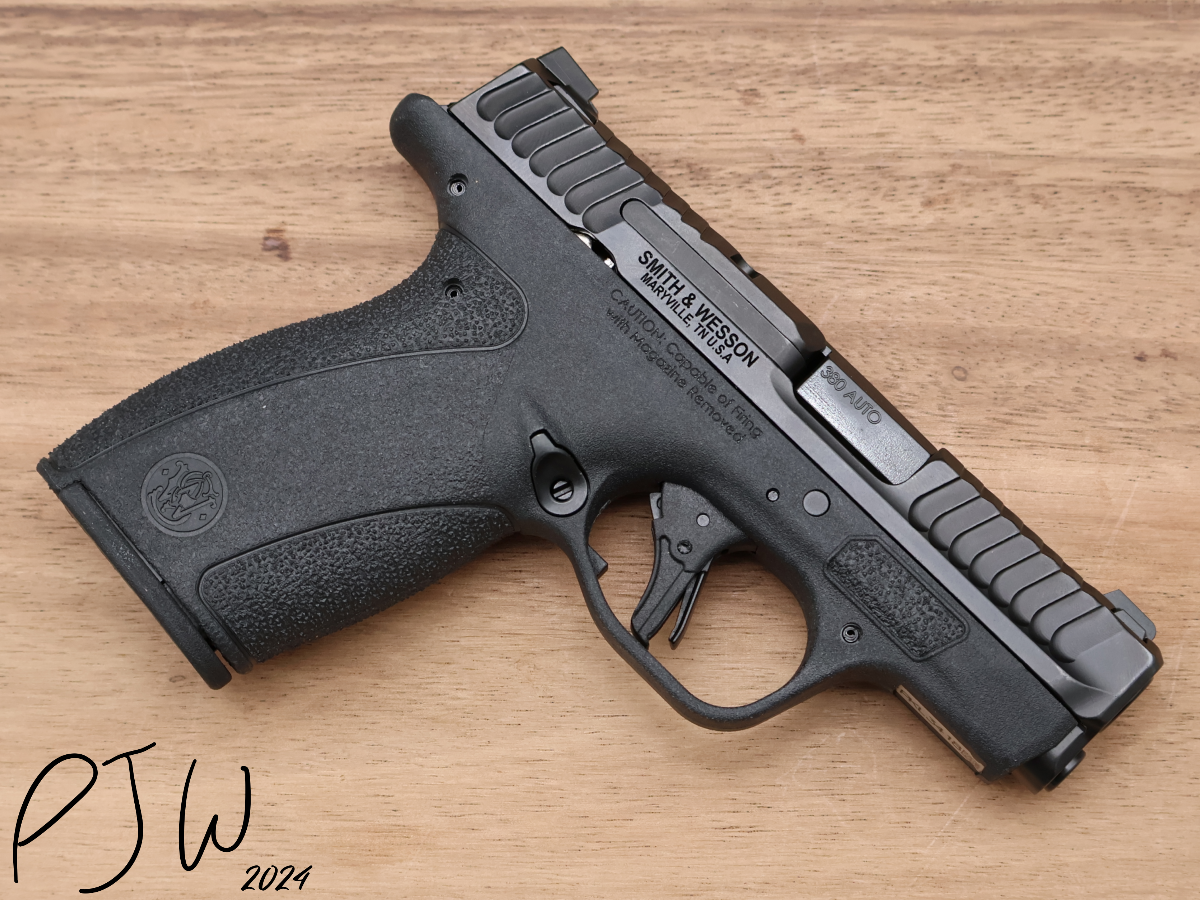
To make the gun thinner, S&W made part of the trigger bar assembly exposed on the gun. Is this inherently bad? No, but it is a new thing for the modern S&W gun. In an effort to “min-max” this gun, S&W has made a gun that requires a more stringent degree of QC to produce properly, one that I do not think they can actually live up to.
I’ll get off of my soapbox, but my point about S&W’s QC process is firm. It sucks.
The Verdict
I bought this gun, and I plan on testing this gun. However, at time of writing, my Bodyguard 2.0 is already on the way back to S&W’s facility to get fixed. If my example worked better, I’d be carrying this gun. It’s the perfect size to go into a pocket, but would work great as a small AIWB gun/NPE gun. The capacity is great, and the shooting characteristics were favorable. However, mine did not work well, and was obviously undercooked when it left S&Ws factory. There will be a full review at some point in the future, but not until I get the gun back, and not until I am able to extensively test it futher.
It’s really a shame that S&W cannot get their QC to be consistent. They make some excellent designs, but that doesn’t matter if the execution is poor.
Further Reading & Patreon Link
Hey there! Thanks for checking out my first impressions with the Bodyguard 2.0. There will be a full review in the future, but until then, check out some of our articles on small guns:
- Heritage Manufacturing Roscoe -First Impressions [2024]
- Ruger LCR 22 Review – Sub Caliber Supremacy
- Ruger Lite Rack LCP 22 Review – A Good LCP
- S&W 442 Review – A (Situationally) Great Classic
If you’d like to support me on Patreon, I’ve got the link for that here. Nearly everything that I do on Primer Peak is paid for out of my own pocket, and my content is not shilled or driven by manufacturers or companies. If you decide to donate, I’d really appreciate it, as it would allow for me to continue to bring you quality work.


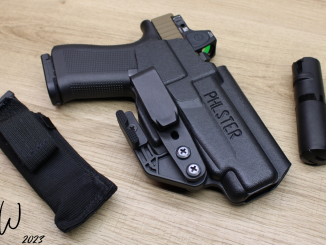
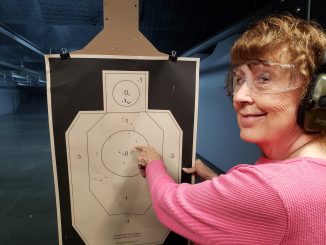

I had the same magazine issue. It worked itself out after a few times loading it. Try tapping the mag to seat the rounds.
Hey Adam!
It’s not in this article, but I made a video update in which I explain what I did to my 12 rounder. No amount of force, tapping, or time would allow 12 rounds to fit. I did a ton of compression cycles, left the magazine loaded, and even pulled it apart to clean it, in the case that it was the issue.
None of that work, so I trimmed the magazine spring down just a little. Now it holds 12 rounds, but only just barely.
A link to that video is here: https://youtu.be/4ZONIc-k-Ds?si=5U-JoiIbWCDI82Nf
I’ll make an update article here on the site soon, as I’ve gotten my gun working, and have been shooting and carrying it a fair bit. Thanks for commenting!